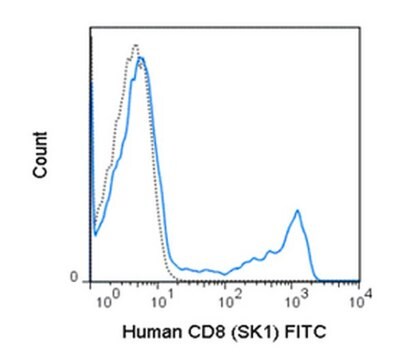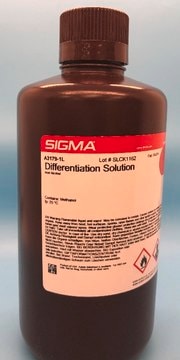MABF167C
Anti-CD8 (human), PE, clone SK1 Antibody
clone SK1, from mouse, PE
Synonym(s):
T-cell surface glycoprotein CD8 alpha chain, T-lymphocyte differentiation antigen T8/Leu-2, CD antigen CD8a, CD8
About This Item
Recommended Products
biological source
mouse
Quality Level
conjugate
PE
antibody form
purified antibody
antibody product type
primary antibodies
clone
SK1, monoclonal
species reactivity
human
technique(s)
flow cytometry: suitable
UniProt accession no.
target post-translational modification
unmodified
Gene Information
human ... CD8A(925)
Related Categories
General description
Immunogen
Application
Inflammation & Immunology
Immunoglobulins & Immunology
Quality
Flow Cytometry Analysis: 0.125 μg from a representative lot detected CD8 in one million human peripheral blood lymphocytes.
Physical form
Storage and Stability
Note: It is recommended to store the product undiluted at 2-8°C and protected from prolonged exposure to light. Do not freeze.
Other Notes
Disclaimer
Not finding the right product?
Try our Product Selector Tool.
Storage Class Code
12 - Non Combustible Liquids
WGK
nwg
Flash Point(F)
Not applicable
Flash Point(C)
Not applicable
Regulatory Listings
Regulatory Listings are mainly provided for chemical products. Only limited information can be provided here for non-chemical products. No entry means none of the components are listed. It is the user’s obligation to ensure the safe and legal use of the product.
JAN Code
MABF1677:
MABF1676:
MABF1678:
Certificates of Analysis (COA)
Search for Certificates of Analysis (COA) by entering the products Lot/Batch Number. Lot and Batch Numbers can be found on a product’s label following the words ‘Lot’ or ‘Batch’.
Already Own This Product?
Find documentation for the products that you have recently purchased in the Document Library.
Our team of scientists has experience in all areas of research including Life Science, Material Science, Chemical Synthesis, Chromatography, Analytical and many others.
Contact Technical Service







